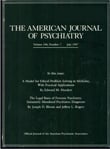TO THE EDITOR: The study reported by Tollefson et al. regarding the efficacy of olanzapine demonstrated the same difficulties that I have described in my review of the risperidone data (
1).
In particular, the patients involved in the study were relatively nonresponsive and demonstrated a weak response to haloperidol (mean reduction of BPRS score of only 7.9, from a baseline mean of 34.1). The mean reduction in the positive symptom score on the Positive and Negative Syndrome Scale for patients given haloperidol was only 3.8 (from a baseline mean of 21.5).
Hegarty et al. (
2) reviewed the literature on schizophrenia outcome and concluded that from 1956 to 1985, 48.5% of schizophrenic patients “improved” with treatment. Hegarty et al. stated that “patients considered as `improved' in follow-up had to have been described as recovered, in remission, well without residual symptoms, minimally or mildly symptomatic, improved without significant deficit, socially recovered, or working or living independently.” It is evident that only a very small minority of the haloperidol group in Tollefson et al.'s study would have met these criteria for improvement.
Moreover, olanzapine was found to have an antidepressant effect and would be expected (because of its reduced tendency to cause extrapyramidal symptoms) to be less likely than haloperidol to exacerbate negative symptoms. Thus, it is especially important to conduct analyses that look at schizophrenic patients alone (i.e., excluding patients with schizoaffective disorder) and to look individually at specific positive symptoms (e.g., hallucinations, delusions, paranoia) to document the effect of olanzapine and haloperidol on typical positive symptoms. I have previously reviewed why neuroleptic-responsive patients, typical of those used for prior studies of standard neuroleptics, are not commonly available for current studies (primarily because of shorter hospitalizations) (
1). Studies with neuroleptic-responsive schizophrenic subjects would be expensive and complex because of the need to extend hospitalization. However, I think it is important to conduct such studies.
In addition, it is important for clinicians who manage psychotic patients to be aware that the available studies with the new atypical neuroleptics do not clearly indicate whether or not these new medications are as effective as standard neuroleptics for positive symptoms in neuroleptic-responsive patients. Finally, to avoid a gulf between research and clinical work (which is often described), researchers must not overgeneralize; i.e., the results of this olanzapine study cannot be assumed to apply to typical neuroleptic-responsive schizophrenic patients.

